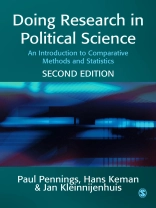This is an immensely helpful book for students starting their own research… an excellent introduction to the comparative method giving an authoritative overview over the research process
– Klaus Armingeon, University of Bern
Doing Research in Political Science is the book for mastering the comparative method in all the social sciences
– Jan-Erik Lane, University of Geneva
This book has established itself as a concise and well-readable text on comparative methods and statistics in political science I…strongly recommend it.
– Dirk Berg-Schlosser, Philipps-University Marburg
This thoroughly revised edition of the popular textbook offers an accessible but comprehensive introduction to comparative research methods and statistics for students of political science. Clearly organized around three parts, the text introduces the main theories and methodologies used in the discipline.
Part 1 frames the comparative approach within the methodological framework of the political and social sciences.
Part 2 introduces basic descriptive and inferential statistical methods as well as more advanced multivariate methods used in quantitative political analysis.
Part 3 applies the methods and techniques of Parts 1 & 2 to research questions drawn from contemporary themes and issues in political science.
Incorporating practice exercises, ideas for further reading and summary questions throughout, Doing Research in Political Science provides an invaluable step-by-step guide for students and researchers in political science, comparative politics and empirical political analysis.
Table of Content
PART ONE: COMPARATIVE METHODOLOGY – Hans Keman
Comparative Methodology and Statistics in Political Science
The Comparative Approach
Theory and Method
Meaning and Use of the Comparative Method
Research Design
PART TWO: STATISTICS IN POLITICAL SCIENCE – Jan Kleinnijenhuis
Concepts, Cases, Data and Measurement
Explorative and Descriptive Statistics
Multivariate Analysis and Causal Inference
PART THREE: DOING POLITICAL RESEARCH – Paul Pennings
How Problems Arise
How Decisions Are Made
How Problems Are Solved
About the author
Current lines of research News effects Economic news and political news, patterns of agenda-building Content Analysis, Semantic Network Analysis












